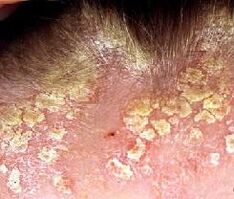
One of the most common forms of the disease is psoriasis of the scalp.
The disease itself is not an infectious process, but nevertheless, the disease persists in an inflammatory nature.
The symptoms of psoriasis are very characteristic of fungal diseases - red or pink spots on the head have a different shape.
In addition to the appearance of single or multiple rashes on the skin, itching, burning and inflammation appear.
Causes of psoriasis
Why does psoriasis occur and what is it? Doctors still do not know why some people get psoriasis. From time to time, doctors come up with new theories and refute old ones. The causes of the development of the disease are often associated with genetic predisposition, and the factors that cause their appearance include:
- Genetic load - parents with psoriasis have been shown to be more likely to have children with this diagnosis.
- Disruption of the formation and maturation of epidermal cells, according to one hypothesis, is the main reason for the development of the disease.
- There is a hypothesis that the cause is not in the epidermis, but in the body's immunity, which produces the wrong factors that adversely affect the skin.
- According to some scientists, disorders of the endocrine system also contribute to the development of the disease.
Today, the most likely cause of the development of psoriasis is considered to be autoimmune processes in the body of a sick person.
Does your hair fall out?
Often, patients suffering from a disease are interested in the question - can hair loss be observed in psoriasis? It should be noted that mass baldness does not occur. If such a process occurs, then it is insignificant, because the hair follicles are deep and the disease does not affect them.
Is Psoriasis Infectious?
This fear is associated with the unusual appearance of psoriasis and its history. In ancient times, psoriasis was mistakenly considered a form of leprosy. From the above reasons for the appearance of psoriasis, it is clear that this disease can not fall into the category of infectious. Therefore, the answer to the question of whether it is possible to get psoriasis is one - no.
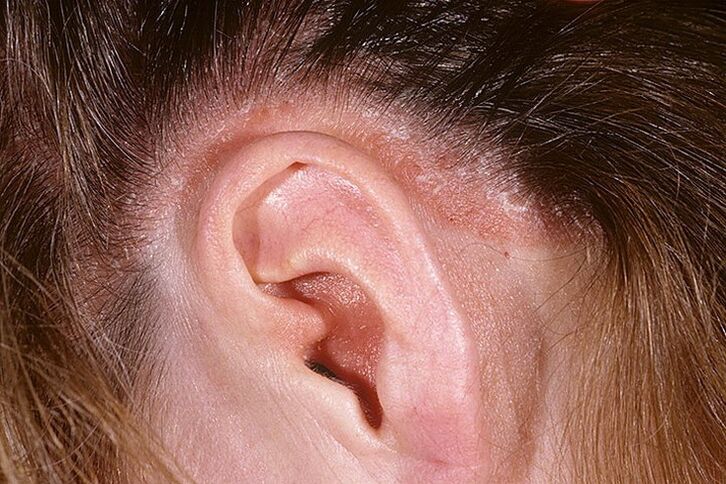
Symptoms
Psoriasis of the scalp is accompanied by the appearance of spots or a characteristic rash on the skin, which is more often represented by plaques ranging from pale pink to brownish red. In most cases, the rash elements are infiltrated from the level of healthy skin to a clear infiltration of more than 1 mm from the minimum palpable height.
In the early stages, only diffuse, inflammatory manifestations and without clear boundaries, abundant peeling in the form of dandruff is possible. This is very similar to other dermatoses of the head, which greatly complicates the differential diagnosis and treatment of psoriasis in the first place.
The most typical symptom of psoriasis is the "psoriatic crown" - the process passes from the scalp to the smooth skin of the adjacent areas of the forehead, above and behind the ears, to the back of the ears; occipital region and back of neck.
There are 3 degrees of scalp damage, depending on the area and severity of symptoms:
- Easy- its main manifestation is the appearance at the beginning of small single lesions covered with thin small scales;
- Heavy- Psoriasis completely affects the scalp, the scales are larger and thicker than the mild severity of the disease.
Clinical studies show that in most patients, no factor can be identified that could explain the onset of the disease. A combination of these causes is often observed, which leads to the classification of psoriasis as a polyetiological disease.
The difference between psoriasis and seborrheic dermatitis
Differential diagnostic signs of psoriasis and seborrheic dermatitis:
- Psoriasis, unlike diabetes mellitus, is characterized by a more pronounced infiltration of rash elements due to acanthosis and hyperproliferation of the epidermis.
- In psoriasis, the rash often extends beyond the scalp to the forehead (called the "psoriatic crown"), neck, and ears.
- Peeling with psoriasis is more oily in dry, diabetic scales.
- Diabetes is accompanied by more pronounced itching.
The patient should also be carefully examined and questioned for damage to the nails and joints, the presence of which may speak in favor of psoriasis and significantly affect the subsequent tactics of therapy.
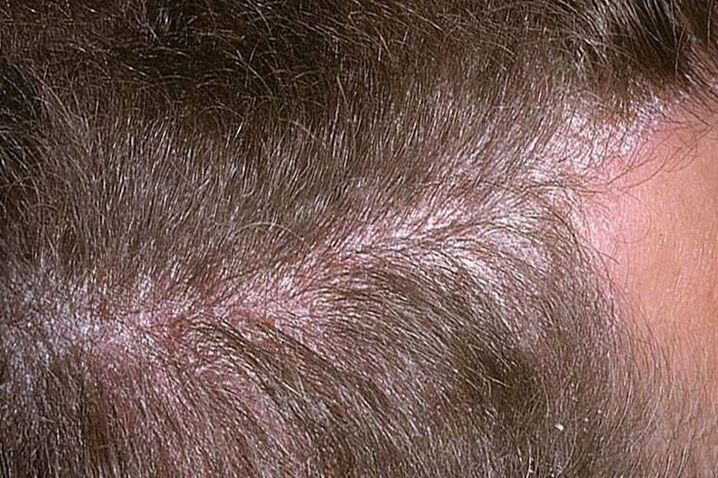
Treatment of scalp psoriasis
When scalp psoriasis is diagnosed, a number of measures are used to treat it, including:
- general therapy;
- local treatment;
- physiotherapy procedures;
- Spa treatment.
In mild forms of psoriasis of the scalp and in the absence of progression, in most cases, topical medications for treatment - shampoos, gels, ointments, tar, etc. it is enough to appoint. At the same time, the therapy of a constantly progressive inflammatory process may require the use of a wider arsenal of pharmacological drugs and physiotherapeutic methods of different groups.
How to treat psoriasis with medication?
Physicians can include the following drugs in the general therapy complex:
- Vitamin complexes and vitamins C, A and B group;
- Non-specific immunotherapy drugs: ATP, Aloe;
- aromatic retinoids;
- cytostatics;
- Hemodesis solution;
- enterosorbents;
- monoclonal antibodies;
- Immunodulators;
- antihistamines;
- NVPS;
- sedatives;
- Calcified autologous blood.
The inclusion of corticosteroids and cytostatics in the course of treatment is recommended in severe psoriasis and significant severity of scalp symptoms. They should be used with extreme caution: such drugs can aggravate the disease.
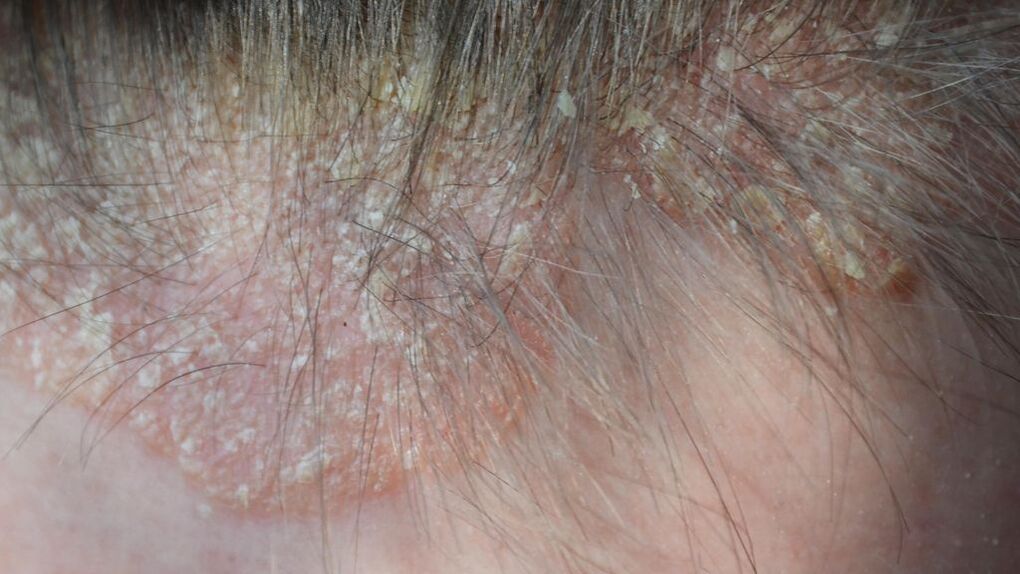
Shampoo for psoriasis of the scalp
Is it possible to treat psoriasis on the scalp with shampoos? As a rule, it is not enough to use even a very effective shampoo. However, the use of specific therapeutic agents in complex therapy is a prerequisite for the success of treatment.
All medicated shampoos help to reduce the inflammatory process, eliminate or reduce itching, but the use of only one shampoo is not effective - treatment should be comprehensive.
Ointments
Topical treatment always helps to increase the effectiveness of the drug. 2% salicylic and bor-salidol ointments will be helpful in the advanced stage of psoriasis. If there is an exudative component and severe inflammation, then the appointment of creams and ointments with corticosteroids will be required.
Non-hormonal ointments contain maple, pine, juniper and charcoal resin. They can be produced in the form of both ointments and pastes.
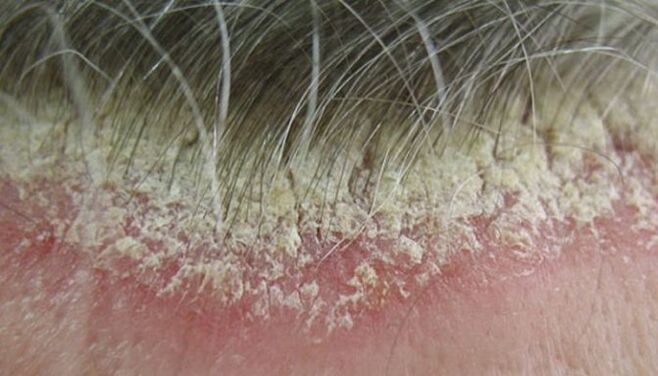
Diet for psoriasis of the head
Nutrition should be uniform. Food portions should be small on a "less but more frequent" basis. The last meal should be no later than 19-00, you are allowed to drink a glass of kefir or yogurt at night.
- It is necessary to completely give up alcohol. Their use during remission can lead to exacerbation.
- Fatty, spicy and smoked foods should be excluded from the diet.
- Sweets are also not recommended - cakes, pastries, chocolate, sugar - all of which should be banned for psoriasis. Only a small amount of honey is allowed.
Drinks tea with hips, hips or currant leaves will be useful.
Spa treatment
During your stay in hospitals, you must follow the following procedures:
- heliotherapy;
- mud treatment;
- bathe in hydrogen sulfide baths and hydrogen sulfide springs.
The course of treatment is carried out in special sanatoriums, which help to reduce the frequency of relapses and achieve long-term remission.
PUVA therapy
PUVA therapy is a physiotherapeutic treatment that involves the use of a photoactive drug and irradiation of the skin with long-wave ultraviolet radiation.
Sufficient long-term use and expert opinion of experts prove the effectiveness of PUVA therapy in the treatment of various dermatological diseases (including psoriasis), especially during a continuous course and the ineffectiveness of other therapeutic methods. According to statistics, a positive effect is achieved in about 80-85% of cases.
Hair care rules
To achieve better condition of your hair and scalp, you should follow the basic care rules, as well as the doctor's recommendations:
- Wash your hair only with the recommended special shampoo.
- Comb your hair with a natural hair comb.
- Systematically treat the scalp with disinfectant mixtures.
- Comb your hair very gently, without damaging the scalp.
- Try to dry your hair naturally without using a hair dryer.
- With psoriasis of the head, it is necessary to avoid complex styles that require the use of different styling products.
























